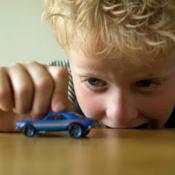 Children and teens with attention-deficit hyperactivity (ADHD) often have difficulty in social situations. They may frequently get into conflicts with peers, have trouble developing and sustaining friendships, or experience other social difficulties. In some instances, these difficulties may be due primarily to symptoms associated with ADHD, such as difficulty focusing, resisting impulses, or other self-regulation issues.
Children and teens with attention-deficit hyperactivity (ADHD) often have difficulty in social situations. They may frequently get into conflicts with peers, have trouble developing and sustaining friendships, or experience other social difficulties. In some instances, these difficulties may be due primarily to symptoms associated with ADHD, such as difficulty focusing, resisting impulses, or other self-regulation issues.
Difficulty focusing impedes individuals with ADHD in that they may not hear everything that is being said or otherwise communicated. As a result, they may miss social cues or relevant information to sustain conversations. In some instances, individuals may “zone out” and be perceived by peers as being uninterested. In other situations, children and teens may be focused on what they want to say and not allow peers to fully contribute to conversations and social interactions. Individuals who have trouble managing impulses to say something, trouble sitting still, or difficulty resisting other impulses often struggle in social situations because peers may find certain actions annoying or irritating.
ADHD does not always occur by itself. There are high comorbidities with anxiety, depression, learning issues, and other conditions. Thus, in some instances, symptoms from co-occurring conditions exacerbate the effect that ADHD symptoms have on social interactions.
Here are a few strategies to help your child/teen with social skills:
- Practice good social skills and behavior at home. If your child/teen is engaging in problematic behavior (i.e., interrupting others, doing something annoying on purpose, being unfocused when having a conversation with you), have a conversation about how these types of behaviors can make it difficult at school and socially. It is best to bring it up when an issue isn’t occurring in the moment. Once you have this initial conversation, figure out a way that is amenable to your child/teen to gently point out when problematic behavior is occurring. Over time, this will help your child or teen learn to recognize when he or she is doing something he/she shouldn’t be doing, and may ultimately lead to it not happening in the first place. You have to be careful, though, that you are pointing things out in a constructive way and that your child/teen views it that way. If the child/teen feels that you are hounding him or her about things, he/she may become upset and, in time, develop negative feelings toward you. Do not embarrass your child/teen; speak privately about problematic behavior that you observe. Don’t bring things up in front of friends or siblings.
- For certain behaviors, you could collaboratively develop a signal that you could use to convey to your child/teen that you are observing something problematic. For instance, if your child/teen chews with his or her mouth open, set up a signal where you hold up your hand and give a two-second gesture, signaling to him or her that he/she needs to chew with mouth closed. As another example, if your child/teen frequently interrupts conversations, set up a signal where you raise one finger when he or she interrupts, signaling to wait for an appropriate time to speak.
- Model good behavior for your child/teen. If you interrupt your child/teen, use foul language, do things intentionally that are annoying, or engage in other negative behaviors, chances are your child/teen will follow your example. It makes it much harder to explain and enforce to your child/teen that such behaviors are wrong if you continue to do them yourself.
Learning and using good social skills is a process, and having a safe environment to practice is important. At the same time, it is vital that any practicing or pointing out of negative behaviors is carried out in a constructive way to avoid any negative impact on your relationship with your child/teen or his or her self-esteem. If you feel that your child/teen is struggling significantly with social skills, seeking out a therapist or counselor or social skills therapy groups can greatly help your child/teen improve on these issues.

The preceding article was solely written by the author named above. Any views and opinions expressed are not necessarily shared by GoodTherapy.org. Questions or concerns about the preceding article can be directed to the author or posted as a comment below.

 No Meds, No Worries: Behavioral Techniques to Improve Focus
No Meds, No Worries: Behavioral Techniques to Improve Focus Pay Attention, Parents! ADHD Answers You've Waited For
Pay Attention, Parents! ADHD Answers You've Waited For Beyond the Medication: Behavioral Treatment for ADHD
Beyond the Medication: Behavioral Treatment for ADHD

Please fill out all required fields to submit your message.
Invalid Email Address.
Please confirm that you are human.
Leave a Comment
By commenting you acknowledge acceptance of GoodTherapy.org's Terms and Conditions of Use.